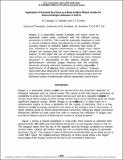Application of exsolved structures as a route to more robust anodes for improved biogas utilisation in SOFCs
Abstract
Biogas is a potentially readily available fuel which could be especially useful when combined with the efficient energy conversion in SOFCs. This could be especially important in rural or remote locations where grid electricity is not available. Biogas contains mixture of methane CO2 with inherently high levels of H2S, therefore to improve performance in biogas more robust anodes are required that are more tolerant to both carbon and sulphur. In this paper the use of catalyst nanoparticles exsolved onto porous as a possible method of producing more resistant structures is discussed. All of the options showed good performance in reformed biogas mixtures with the exsolved structures showing improved resistance to carbon deposition. The performance of all dropped when exposed to sulphur, however many were also observed to recover once this was removed and so give encouragement for the development of robust anodes that can withstand sulphur breakthrough without catastrophic stack failure.
Citation
Cassidy , M , Gamble , S R & Irvine , J T S 2015 , Application of exsolved structures as a route to more robust anodes for improved biogas utilisation in SOFCs . in K Eguchi & S C Singhal (eds) , 14th International Symposium on Solid Oxide Fuel Cells, SOFC 2015 . ECS Transactions , no. 1 , vol. 68 , Electrochemical Society , pp. 2029-2036 . https://doi.org/10.1149/06801.2029ecst
Publication
14th International Symposium on Solid Oxide Fuel Cells, SOFC 2015
ISSN
1938-6737Type
Conference item
Description
The authors would like to thank the EPSRC-DST India-UK Collaborative Research Initiative in Fuel Cells project EPI037016/1 “Advancing Biogas through Fuel Flexible SOFC” for funding this work.Collections
Items in the St Andrews Research Repository are protected by copyright, with all rights reserved, unless otherwise indicated.

